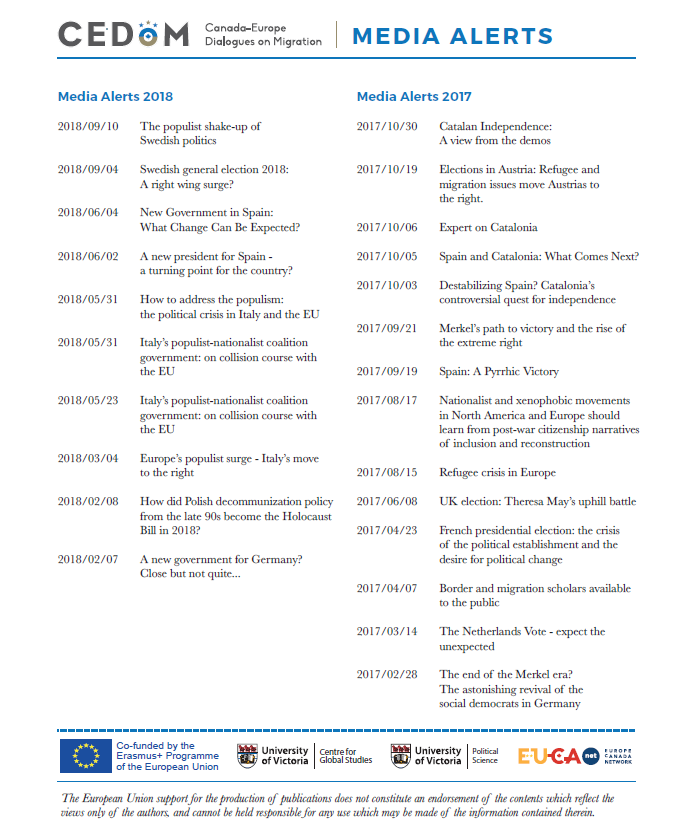Canadian Displacement Dates: When Will you Become Environmentally Displaced? , by Isolde Murdoch
By Isolde Murdoch, student of the University of Victoria
Compared to the majority of the world, those living in Canada enjoy a nation high in resources and a climate favourable to agricultural production. Due to the rapid increase of climate changes and environmental depletion, this will become even more apparent over the next couple of decades. Although, we will find ourselves in a much more comfortable and stable position, than much of the world – which has begun to, and will increasingly experience extreme weather, followed by high levels of famine, conflict and migration – this does not in any way mean that Canada will not feel the direct and indirect effects of environmental changes.
There are Canadian populations who will be forced to flee their homes in search of protection from climate changes and environmental disasters. In particular, low coastal regions, such as those living on Canada’s Arctic and Pacific coastal areas, will continue to see rapidly rising sea levels, which will result in more severe flooding, and ultimately, these areas could become uninhabitable as they are consumed by the sea. If the land in highly populated areas is washed away, such as in some areas of Greater Vancouver, this will result in massive numbers of environmentally displaced persons. Also, severe environmental events, such as the Fort McMurray wildfire in 2016 or the storm in 2013 that forced 100,000 Albertans to flee their homes due to flooding, will become more prevalent and harsh, resulting in greater incidences of temporary displacement. Even though Canadians will be displaced, temporarily or permanently, it is likely that these people will be able to relocate within Canada. This is not going to be the case for the rest of the world, most of whom will have no choice but to flee their countries out of a desperation to survive.
With this said, it is highly likely that Canada will increasingly be seen as a desired country of relocation, and soon, one of the only liveable countries with an adequate level of resources; particularly that of water. Furthermore, history has shown that when a nation, particularly a developed nation, has depleted their own resources, they turn around and deplete the resources of another. As nations are faced with the inability to provide the necessities of life to their citizens, it is to be expected that extreme measures would be taken to acquire such resources. Rather than hypothesize on the horrifying measures that could taken against Canada, I question: what measures can be taken to combat climate change from occurring so rapidly, as well as to help nations adapt to the realities of severe environmental events and to assist populations to stay in their home countries, or receive support to relocate when necessary? Without policies and plans in place to deal with the catastrophic effects of environmental changes, Canada will inevitably face a precarious future.
Although Canadians may not experience imminent displacement from climate change, it seems very probable that without prompt and sufficient action, that Canadians could find themselves displaced due to the effects of conflict or war between Canada and countries starving for resources.
What is your displacement date?











Living on Vancouver Island, this article presents a very real issue with the rising sea levels threatening our existence as a coastal community. This threat places us at the center of this conversation as the inevitability of rising ocean levels will undoubtedly affect us. However, this article seems to take a very realist perspective when coming to the political consequences of climate change and displacement. While migration tensions and social change will be inevitable in this climate change future, the article presupposes the failure of humanity to slow the effects of consumption and pollution as well as assuming other states will be viewing resources through a realist lens.
While it presents Canada as a destination country for environmental migrants due to its vast amount of land and resources, it assumes states who do not have enough of their own resources may invade others for theirs. While this may be the case in some parts of the world, Canada, due to its unique geography and few bordering countries, would most likely be exempt from an invasion force. Putting aside the possibility for an invasion, international pressure for Canadian resources may continue to rise to a point where we can no longer keep up without putting our environment in further jeopardy. The impacts of this boost in trade could further the extent of soil erosion, floods, and wildfires as harvesting continues
This article brings up a crucial question in asking how states can prepare for the effects of climate change and the migrants it will bring. Asking this question, while will aid states with future legislation on how to deal with both the physical effects of climate change as well as the social issues which come with the potential environmental migrants. While many of the impacts of climate change have yet to be felt, Canada can prepare by securing potentially vulnerable areas by investing in infrastructure to slow the environmental impacts. Furthermore, Infrastructure can be established to help future migrants disperse across the country, ensuring resources are properly distributed and overcrowding in cities avoided.
Many of these proposed catastrophes can be lessened by acting now to combat climate change. In addition to reviewing future legislation and fortifying our country against climate change, we can implement carbon reducing policies and invest in clean energy to reduce the amount of pollutants our state produces. While Climate change is inevitable, we can take action to help slow the effects down and perhaps extend other’s displacement date.
Tom Gummo, student of Political Science at the University of Victoria
In reading Isolde Murdoch’s blog post about the connection between the climate crisis and
the internal displacement of communities within Canada, I could not help but think about the
broad, internationally-rooted challenges that the climate crisis will continue to highlight. One of
these challenges is responding to the growing number of displaced individuals who will flee their
homes as a result of the changing environment. In response to Murdoch’s question of “what
measures can be taken to combat climate change from occurring so rapidly, as well as to help
nations adapt to the realities of severe environmental events and to assist populations to stay in
their home countries, or receive support to relocate when necessary?”, I contend that a challenge
of this scale can only be resolved through cooperation on the part of the international community
to help build the capacity of every country around the world to respond to this crisis.
With this contention in mind, I believe that those countries with the greatest economic
capacity should take concrete climate action domestically, while also fundamentally re-thinking
their role in providing the developing world with a chance to reach the same capacity. According
to a 2018 report published by the World Bank entitled Groundswell: Preparing for Internal
Climate Migration, beyond goals like cutting greenhouse gas emissions, embedding climate
migration into future development planning is one of the key areas on which members of the
international community need to focus their energy. If mitigation efforts are not taken almost
immediately, this report estimates that by 2050, there will be well over 100 million internally
displaced persons within the Sub-Saharan Africa, South Asian, and Latin American regions
alone. According to this report, domestic governments have a role to play by preparing laws,
policies, and strategies to respond to “people moving from areas of increasing climate risk into
areas that may already be heavily populated”. As they move toward the implementation of these
policies, governments around the world will require “guidance, technical assistance, and capacity
building”. This is a role that members of the international community, including Canada, can
help fulfill. Although Murdoch’s blog post focuses primarily on the impact of the climate crisis
on Canadians domestically, building the capacity of other countries to respond to their own
challenges will benefit the international community at large. After all, according to Murdoch,
Canada “will increasingly be seen as a desired country of relocation” for those fleeing countries
that lack an adequate level of resources to sustain them. In other words, international cooperation
can help ensure that those who emigrate from their home country do so because they choose to,
rather than because their home country lacks the capacity to respond to a growing lack of
resources.
With this being said, one must keep in mind that for countries like the United States and
Canada, there is a fine line to walk when advocating for policy change in the developing world.
If the process of advocating for policy change is undertaken without the necessary consideration
for the historical context of injustice and inequity in these relationships, states like Canada and
the U.S. will come off as hypocritical, given the fact that they have often benefited from the
subjugation of states in the Global South. As a result, it is understandable if countries in the developing world are skeptical about taking advice from those who have long benefited from the
same fossil-fuel driven system that they are now rejecting. This is particularly true given that
states in the Global North are not necessarily advocating for policy changes out of the goodness
of their own hearts, but rather because they understand the consequences of an unprecedented
number of people fleeing their home countries as a result of the changing climate.
I believe that there is some truth in this argument, which suggests that governments in the
Global North should be careful about their advocacy for policy change in climate change
mitigation efforts beyond their own borders. At the same time, I believe that members of the
international community would be well-served in remembering that the scale of the climate crisis
is perhaps unlike any other in the history of our planet. As a result, in achieving a substantive
response to climate migration, an uncoordinated, isolationist response is simply not an option.
Put differently, policies that conceptualize climate migration as a local, or even regional issue,
will fail.
During the Webinar on March 13th, in response to a question about why the
international community rarely focuses on issues associated with migration beyond their own
borders, Dr. Vallet spoke about her belief that the issue of migration is often framed as either
localized or regionalized, but very rarely through a global lens. Further, Dr. Vallet stated her
belief that as long as the forces of inequality and climate change persist under the current
international economic order, bad-faith actors in the political realm, most notably those on the
far-right, will continue to scapegoat immigrants as the causes behind these issues. The reality, I
would argue, is that immigrants are some of the most egregious victims of the current system.
To summarize, in order for the international community to put forward legitimate solutions
to the increasingly important issue of climate migration, the foreign policy institutions of
countries around the world need to re-align their gaze away from local issues like securitizing
borders, and toward developing the capacity of countries around the world to respond to this
crisis.
Sources
“Groundswell: Preparing for Internal Climate Migration.” The World Bank. March 19, 2018.
Murdoch, Isolde. “Canadian Displacement Dates: When will you become environmentally
displaced?” blog.eucanet.org. November 16, 2018.